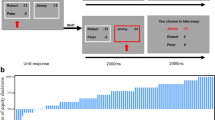Abstract
Gender role (i.e., masculinity and femininity), personality traits, age, and level of education were used as discriminators of moral orientation in an examination of their role in the process of moral decision making. Responses of adult participants indicated the justice orientation to be most strongly associated with personality characteristics of judging and intuition; the care orientation was most strongly associated with perceiving and sensing. Masculinity and femininity, however, contributed very little to the analysis. Results indicate moral orientation may be less differentiated by gender role patterns and more by characteristics of the personality, involving perception of information and type of judgment.
Similar content being viewed by others
REFERENCES
Bem, S. L. (1981). Bem Sex-Role Inventory: Manual. Palo Alto, CA: Mind Garden.
Card, C. (1995). Gender and moral luck. In V. Held (Ed.), Justice and care: Essential readings in feminist ethics (pp. 79-98). Boulder, CO: Westview Press.
Colby, A., &Kohlberg, L. (1987). The measurement of moral judgment (Vol. 1). NY: Cambridge University Press.
Friedman, M. (1993). What are friends for? Feminist perspectives on personal relationships and moral theory. Ithaca, NY: Cornell University Press.
Friedman, M. (1995). Beyond caring: The demoralization of gender. In V. Held (Ed.), Justice and care: Essential readings in feminist ethics (pp. 61-77). Boulder, CO: Westview Press.
Gilligan, C. (1982). In a difference voice: Psychological theory and women's development. Cambridge, MA: Harvard University Press.
Gilligan, C., &Attanucci, J. (1988). Two moral orientations. In C. Gilligan,J. V. Ward, &J. M. Taylor (Eds.), Mapping the moral domain (pp. 73-86). Cambridge, MA: Harvard University Press.
Gilligan, C.,Ward, J. V., &Taylor, J. M. (Eds.). (1988). Mapping the moral domain. Cambridge, MA: Harvard University Press.
Gilligan, C., &Wiggins, G. (1988). The origins of morality in early childhood relationships. In C. Gilligan,J. V. Ward, &J. M. Taylor (Eds.), Mapping the moral domain (pp. 111-138). Cambridge, MA: Harvard University Press.
Golombok, S., &Fivush, R. (1994). Gender development. NY: Cambridge University Press.
Jung, C. G. (1971). Psychological types. Princeton, NJ: Princeton University Press.
Lapsley, D. (1996). Moral psychology. Boulder, CO: Westview Press.
Lyons, N. (1987). Ways of knowing, learning, and making moral choices. Journal of Moral Education, 16(3), 226-239.
Lyons, N. (1988). Two perspectives: On self, relationships, and morality. In C. Gilligan,J. V. Ward, &J. M. Taylor (Eds.), Mapping the moral domain (pp. 21-48). Cambridge, MA: Harvard University Press.
Myers, I. B., &McCaulley, M. H. (1989). Manual: A guide to the development and use of the Myers-Briggs Type Indicator. Palo Alto, CA: Consulting Psychologists Press.
Pratt, M. W.,Golding, G., &Hunter, W. J. (1984). Does morality have a gender: Sex, sex role, and moral judgment relationships across the adult lifespan. Merrill-Palmer Quarterly, 30(4), 321-340.
Walker, L. J. (1991). Sex differences in moral reasoning. In W. M. Kurtines &J. L. Gewirtz (Eds.), Handbook of moral behavior and development: Vol. 2. Research (pp. 333-364). Hillsdale, NJ: Erlbaum.
Yacker, N., &Weinberg, S. L. (1990). Care and justice orientation: A scale for its assessment. Journal of Personality Assessment, 55(1 and 2), 18-27.
Author information
Authors and Affiliations
Rights and permissions
About this article
Cite this article
Glover, R.J. Discriminators of Moral Orientation: Gender Role or Personality?. Journal of Adult Development 8, 1–7 (2001). https://doi.org/10.1023/A:1026401703380
Issue Date:
DOI: https://doi.org/10.1023/A:1026401703380




